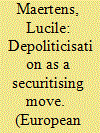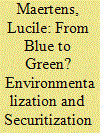| Srl | Item |
| 1 |
ID:
161271


|
|
|
|
|
| Summary/Abstract |
Created in 1972, the United Nations Environment Programme (UNEP) has a normative mandate to promote the protection of the environment at the international level. However, since 1999, the organisation has been conducting field assessments in postconflict situations and addressing the role of natural resources in conflict, framing the environment as a security issue. To do so, the programme insists on its neutrality as a technical and ‘apolitical’ actor within the UN system. Considering depoliticisation as a political act, this article unpacks the concrete practices by which international organisations (IOs) enact depoliticisation. It further argues that IOs can perform securitising moves through practices and techniques presented as outside of the political realm. It draws upon the recent work on depoliticisation at the international level and reinforces studies considering the links between (de)politicisation and securitisation.
|
|
|
|
|
|
|
|
|
|
|
|
|
|
|
|
| 2 |
ID:
165114


|
|
|
|
|
| Summary/Abstract |
The cholera outbreak brought to Haiti in 2010 as a consequence of wastewater mismanagement in one of the UN Stabilisation Mission’s camps drew attention to the concrete material footprint of UN peace operations. Since the 2000s, UN peacekeeping missions have been increasingly confronted with environmental challenges. Multiple transformations in terms of norms and practices resulted from these environmental concerns. Drawing on data generated through interviews and participant observation, this article explores how environmental concerns are integrated in UN peacekeeping operations and develops a two-fold argument. First, I argue that the inclusion of environmental concerns in UN peacekeeping relies on the environmentalization of peacekeeping practices. It consists of heterogeneous elements – standards, expertise, training, mainstreaming, equipment management – which focus on the ecological footprint of UN peacekeeping. Second, I show that environmentalizing peacekeeping contributes to the securitization of the environment. By understanding the dynamics of inclusion of environmental concerns, this article sheds light on one of the ways through which emerging issues broaden and widen UN peacekeeping practices.
|
|
|
|
|
|
|
|
|
|
|
|
|
|
|
|